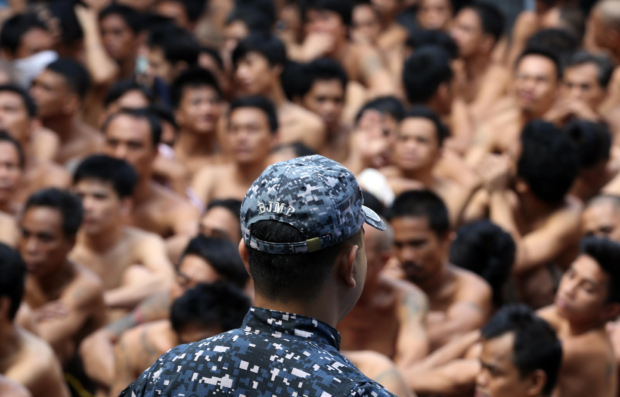
File photo of a jail facility in Quezon City under the supervision of the Bureau of Jail Management and Penology (BJMP). INQUIRER PHOTO /NINO JESUS ORBETA
The Bureau of Jail Management and Penology (BJMP) has allowed the Commission on Human Rights (CHR) to, among others, review its rules on jail management, antitorture and decongestion efforts, in a novel agreement that aims to improve the human rights situation in an institution prone to abuse and undignified conditions for inmates.
On Monday, the agencies led by CHR Chair Richard Palpal-latoc and BJMP Director Ruel Rivera signed a five-year agreement to collaborate more closely through human rights training and joint projects to improve the welfare of inmates in BJMP facilities.
“This is the first time the CHR and BJMP are entering into an agreement addressing the rights of PDL (persons deprived of liberty), and [the] immediate goal is to capacitate BJMP personnel on the human rights aspect of their work,” Palpal-latoc said.
Among the salient features of the agreement, which will be effective until Dec. 31, 2028, is the review of BJMP measures and to bring them in line with international rights standards, such as the Mandela Rules against torture and inhumane treatment of prisoners.
Devised by the United Nations Office on Drugs and Crime, the rules are “based on an obligation to treat all prisoners with respect for their inherent dignity and value as human beings, and to prohibit torture and other forms of ill-treatment.”
Palpal-latoc said they would also craft an antitorture mechanism to minimize this punitive practice against inmates.
Decongestion
The CHR and BJMP will also work on decongestion activities to ease overcrowding in Philippine jails, often ranked “one of the most congested in the world.”
Palpal-latoc added they are hoping to speed up decongestion efforts by identifying overstaying inmates and possibly by intervening in the cases of elderly and sickly prisoners.
Rivera said the national congestion rate of Philippine jails stood at 358 percent.
The provinces in Calabarzon (Cavite, Laguna, Batangas, Rizal, Quezon) region have congestion rates that are reportedly above the national rate.
Specifically, Rivera flagged the situation in the 110-square-meter San Mateo municipal jail in Rizal province, which has a current congestion rate of 2,091 percent.
Rivera said they had already requested San Mateo Mayor Omie Rivera to donate at least 1,600 sq m of land as well as funding to build new facilities. INQ